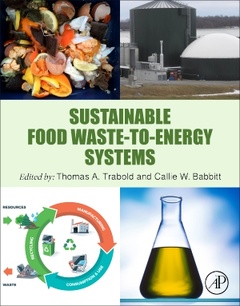Sustainable Food Waste-to-Energy Systems
Coordonnateurs : Trabold Thomas, Babbitt Callie W.

Sustainable Food Waste-to-Energy Systems assesses the utilization of food waste in sustainable energy conversion systems. It explores all sources of waste generated in the food supply chain (downstream from agriculture), with coverage of industrial, commercial, institutional and residential sources. It provides a detailed analysis of the conventional pathways for food waste disposal and utilization, including composting, incineration, landfilling and wastewater treatment. Next, users will find valuable sections on the chemical, biochemical and thermochemical waste-to-energy conversion processes applicable for food waste and an assessment of commercially available sustainable food waste-to-energy conversion technologies. Sustainability aspects, including consideration of environmental, economic and social impacts are also explored.
The book concludes with an analysis of how deploying waste-to-energy systems is dependent on cross-cutting research methods, including geographical information systems and big data. It is a useful resource for professionals working in waste-to-energy technologies, as well as those in the food industry and food waste management sector planning and implementing these systems, but is also ideal for researchers, graduate students, energy policymakers and energy analysts interested in the most recent advances in the field.
1. Introduction 2. Waste resources in the food supply chain 3. Conventional pathways for food waste utilization and disposal 4. Sustainable waste-to-energy technologies – chemical and biochemical 5. Sustainable waste-to-energy technologies – thermochemical 6. Environmental aspects of food waste-to-energy conversion 7. Economic aspects of food waste-to-energy system deployment 8. Policy and regulatory considerations 9. Waste-to-energy system logistics and deployment
Appendix A: Physical and chemical properties of selected food wastes Appendix B: Biomethane potentials of selected food wastes Appendix C: Sources of food waste resource and conversion data
Professionals working in waste to energy technologies, professionals working in food industry and food waste management sector, researchers, graduate students, energy policy makers, and energy analysts interested in the most recent advances in the field.
Dr. Callie Babbitt is an Associate Professor in the Golisano Institute for Sustainability (GIS) at Rochester Institute of Technology (RIT). Her research group focuses on developing and applying tools to understand and manage the life cycle implications of emerging technologies. Specific focal areas are consumer electronics, nanomaterials, photovoltaics, and lithium ion batteries, and food waste-derived biofuels. These sectors represent complex sustainability challenges, as they are characterized by rapid development, adoption, and evolution; high potential for environmental impact across all life cycle stages; and a lack of comprehensive data that can be used to accurately quantify potential environmental impact. Dr. Babbitt is a recognized expert in environmental assessment of emerging technologies, and was awarded an NSF CAREER Grant in 2013.
- Provides guidance on how specific food waste characteristics drive possible waste-to-energy conversion processes
- Presents methodologies for selecting among different waste-to-energy options, based on waste volumes, distribution and properties, local energy demand (electrical/thermal/steam), opportunities for industrial symbiosis, regulations and incentives and social acceptance, etc.
- Contains tools to assess potential environmental and economic performance of deployed systems
- Links to publicly available resources on food waste data for energy conversion
Date de parution : 09-2018
Ouvrage de 292 p.
21.4x27.6 cm



